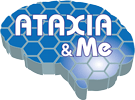Rare Disease Has No Borders
My name is Mark Desa. I’m from Ontario, Canada – just outside of Toronto. I have ARCA1 (or Autosomal Recessive Cerebellar Ataxia type 1). This is my story.
My childhood was very happy. As I grew older, I became active in karate and weight training. It wasn’t until about my mid-30s that people started to notice marked issues with my speech, balance and coordination. Looking back, there were incidences of poor balance/coordination, but as they were isolated, I just shrugged them off. In my 30s, they had all started to come together. There were also cognitive and emotional issues, but I’m not sure that those can completely be attributed to Ataxia.
MY DIAGNOSIS
Once things started to get really noticeable, it was recommended that I see a neurologist. He examined me using some balance/coordination/speech tests and sent me for an MRI. The conclusion of the MRI (diffuse cerebellar atrophy or shrunken cerebellum) led him to believe I had Ataxia – which was my first time hearing that term. My neurologist sent me for blood-work just to be sure. My blood was then sent for genetic testing to the University of Chicago. It was around $5400, but thankfully my genetic counsellor from the hospital submitted some forms to OHIP (Ontario Health Insurance Plan) and they paid for it.
Once the results came back (about 6 months later I think), it was confirmed I have ARCA1. It is a very rare form of genetic Ataxia. It is known as type 1 or Beauce type as Beauce is the region in Québec where it was first discovered. Although it is a genetic disorder, it progresses very slowly. Also, it is recessive, so my parents don’t have it. Recessive genes are common in nature. A red-haired child can be born to parents without red hair and I think albino animals/humans can be born to non-albino parents.
It doesn’t appear anyone in my family has had it, but that is difficult to confirm. My parents and their families grew up in fairly small villages with no access to the kinds of medical/scientific research we have now.
At the present time, my issues include:
Slurred speech (or dysarthria) poor balance, poor coordination manual dexterity issues/poor fine motor skills. This presents itself a lot if I try to write (my writing is quite shaky and restricted to printing). I also have great difficulty in using tools like screwdrivers. Mild cognitive issues. I find short-term memory to be my biggest challenge in this area.
MY PROGNOSIS
As far as a medical outlook goes for me, it is inconclusive. The neurologist doesn’t really have an answer. I was unable to research and find anything conclusive myself. I did see some information that indicated ARCA1 patients may need a walker or similar 10-15 years after their symptoms start to present themselves. I know, however, that there are a lot of factors that may have an influence on this outcome.
MY HOPE
Despite all this information above, I am still hopeful. My diagnosis is only one small fragment of me – as a person. I continue to rely on my martial arts training which dictates that I should keep practising. And in some ways, I’ve gotten better. Here are some notes about the things I do:
Balance and coordination are still major issues. The winter can sometimes get me down. Walking on the ice can be treacherous. I regularly practice my falling, however, in the hope that I can fall without getting injured. I train in boxing and Muay Thai regularly, sometimes in group classes. I find that being pushed beyond my limits sometimes changes my own perception of my limitations. Boxing also helps with footwork and balance. Changing my diet has helped a lot. I try to not eat any processed or foods with additives or preservatives. My preference is whole, fresh fruits/vegetables and meat from a farm I trust. After I was diagnosed with Ataxia, I read some brain books which indicated that I should learn new skills. So I went out and bought an electric guitar. Although I still have a long way to go, I can play a little better than I ever thought possible given my manual dexterity issues. After I got diagnosed, I also went out and got my personal training certificate and hope to train others with movement disorders one day.
That’s all I have to say about my condition for now. I hope you found it helpful.
We would like to thank Mark for sharing his journey with us. If you would like to know more about him be sure to check out his blog at www.markeded4glory.com If you would like you can contact Mark via email mark@marked4glory.com, Twitter @ataxiaswag or Mark Desa on Facebook.
If you would also like to get involve and share your experience with Ataxia or other rare condition, please get into contact with us through our social media linked below:
